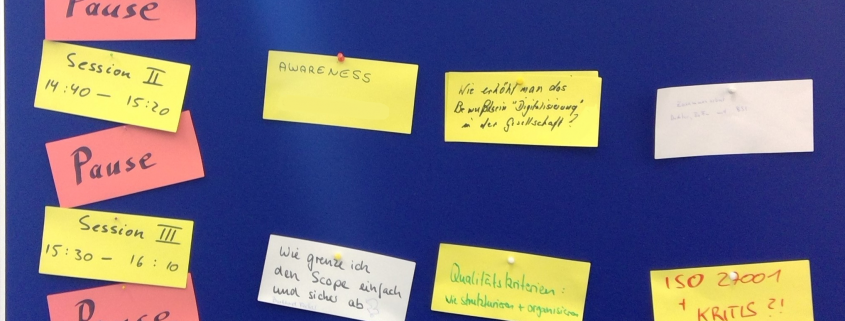BarCamp “Information Security Management in Credit Institutions” — 19 September 2019
In cooperation with SRC Security Research & Consulting GmbH, Bank-Verlag GmbH hosts a BarCamp on the subject of “Information Security Management in Credit Institutions”. The event will take place on 19 September 2019 at the premises of Bank-Verlag in Cologne.
The Federal Financial Supervisory Authority (BaFin) has also defined the new function of the Information Security Officer with the “Banking Supervisory Requirements for IT” (BAIT). He or she controls the information security process and reports directly to management. What this theory looks like in practice will be examined in more detail on 19 September at the BarCamp “Information Security Management in Credit Institutions”.
The BarCamp Principle
A BarCamp is an open conference with practical workshops. The workshops serve the exchange and discussion among the participants. At the beginning, the participants themselves develop the contents and the agenda, which they then develop further. There are no predefined speakers or procedures to be found in a BarCamp. Instead, this principle relies on the (moderated) exchange of experience.
BarCamp “Information Security Management in Credit Institutions
The BarCamp “Information Security Management in Credit Institutions” gives Information Security Officers as well as all those responsible for information and IT security management at credit institutions the opportunity to exchange information on topics such as BAIT audits, service provider management or risk management. In addition, contacts can be established and expertise expanded. The coffee breaks can be used for individual discussions. At the end of the event, a “get-together” provides an in-depth exchange among the participants.
The SRC Speakers
Four experts from different areas of SRC will share their knowledge and expertise with the participants.
Sandro Amendola, deputy head of the evaluation body at SRC, is responsible for the topic “IT compliance in the banking industry”. In addition, he develops security concepts and security requirements for payment transaction procedures on behalf of the German banking industry, among others.
Jochen Schumacher is responsible for communications at SRC. He concentrates on product management, the technical and editorial support of the website as well as the planning, implementation and moderation of events.
Florian Schumann is Head of IT at SRC. In addition, he is an information security consultant and qualified auditor according to § 8 (a) BSIG for critical infrastructures.
Dr. Deniz Ulucay works at SRC as a consultant for information security. His focus is on the development of ISMSs, in particular for operators of critical infrastructures. He is also responsible for the development and implementation of security concepts.
Registration & Schedule
Further information about the registration and the course of the BarCamp on the topic “Information security management in Credit Institutions” can be found in this flyer (GER) and on the website of Bank-Verlag. Here you can register directly online for the event and bring in the topics that are important and interesting for you and thus help to determine the course and outcome of the BarCamp “Information Security Management in Credit Institutions”.
For further questions Mrs. van Kessel is at your disposal (Tel. 0221/5490–161, andrea.vankessel(at)bank-verlag.de).





